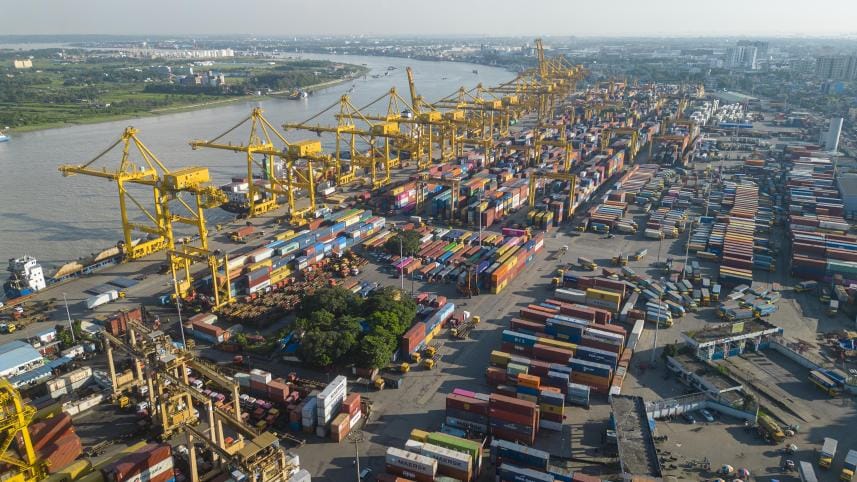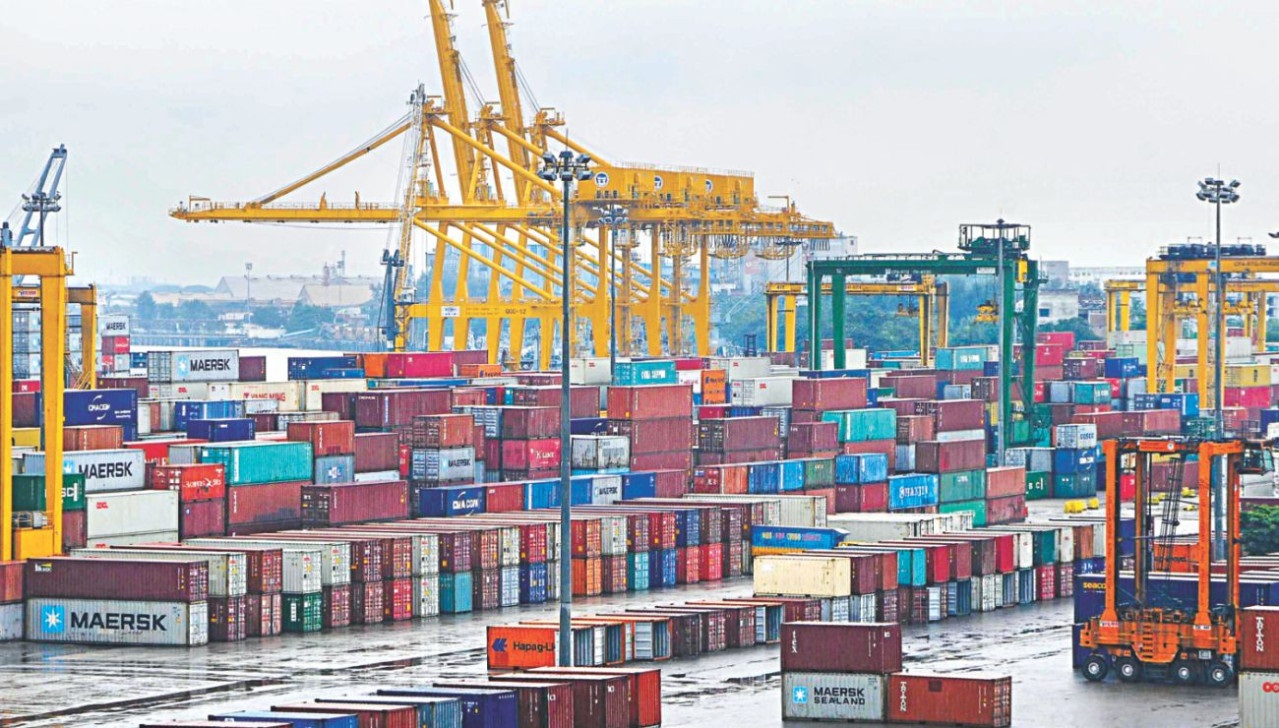Our ports are national assets, not bargaining chips

The interim government seems eager to hand over management of the New Mooring Terminal of the Chattogram port to a company called DP World from Abu Dhabi. Although no formal deal has been signed yet, newspapers report that officials of the company have been visiting the port regularly. In his June 6 speech this year, Chief Adviser Prof Muhammad Yunus also urged people to resist those opposing this move.
It is no secret that Bangladesh is in a geographically advantageous position due to its seaports, both located in the southern part of the country, opening to the Bay of Bengal. Beyond the obvious benefits for international transport and communication, the Bay holds both known and untapped natural resources, including vast reserves of oil, gas, and minerals, which demand the presence of enhanced security in the area. Since Bangladesh lacks strong national capacity in this matter, many believe the presence of foreign operators in the ports might increase the security risk in the area. Yet, successive governments have continued their attempts to lease out the Chattogram port.
It first began around 1997. We were repeatedly told that the port's performance was very poor and that its future was at risk. The proposed "solution" was to lease out parts of the port to a US company to build and operate a new container terminal. Between 1997 and 1999, several foreign maritime companies submitted proposals to build a "private port" in the Chattogram area. Among them, the US company, Stevedoring Services of America Inc. (SSA), submitted its proposal on December 29, 1997. Meanwhile, local lobbying groups became active to accelerate the process.
The port authorities had their own development proposal, but it was ignored and buried in files. Meanwhile, the SSA company quickly moved ahead, even without a proper tender process, as the then government began direct negotiations with them.
The proposed terminal site was at the mouth of the Karnaphuli River—right where the port opens to the sea. The contract offered 20.97 acres of land at Patenga on a 99-year lease for the first phase, and another 99 years for later phases, making it effectively a 210-year licence, divided into seven 30-year terms. The proposed deal also stated that if the company wanted more land in the future, the shipping ministry would help secure ownership for them. This raised serious concerns.
A look at various official meetings, decisions, and committees from that time shows how ministries and "experts" shaped the process to suit the foreign companies' interests. Within a few months, the cabinet approved SSA's proposal and sent it to the shipping ministry. By early 2000, the ministry engaged Infrastructure Investment Facilitation Centre (IIFC), a so-called government agency allegedly funded and guided by the World Bank, to provide "expert negotiation support" with SSA.
Although a new government took office in 2001, the port deal continued. A "secretaries committee", formed with six top bureaucrats, strongly recommended SSA's proposal in its report on April 30, 2002. Apparently, top US and World Bank officials in the country at that time pressed the then government to approve the deal urgently, claiming no tender was necessary since "all discussions were transparent" and the IIFC had given a favourable opinion.
What we see now with DP World follows a similar pattern.
Back then, however, a strong public resistance grew against this destructive alliance of Bangladesh's two consecutive governments, foreign interests, and the bureaucratic elite. Alongside the movement by port workers, the National Committee to Protect Oil, Gas, Mineral Resources, Power and Ports organised a long march from Dhaka to Chattogram in 2002. Meanwhile, former port chairman Engineer Mahmud-ul-Islam and others filed a petition at the High Court, represented by Dr Kamal Hossain and Harisadhan Dev Brahman.
By the end of 2002, court hearings revealed the project was fraudulent. A newly created company had used the name of SSA to secure a massive loan under the port deal, and both local and foreign forces were backing it. Thanks to the court verdict and public movement, the fraudulent project was finally cancelled.
After that plan was scrapped, their activities took a new turn, especially during the caretaker government of 2007, towards turning the Chattogram port into a shell under private capital control. At first, local businessmen were happy, but it later became clear that the policies were taken mainly to serve multinational interests. Now the interim government, to serve a foreign company's interest, did not hesitate to raise all port tariffs even at the risk of negatively affecting national economy and local businesses.
It is true that because of Bangladesh's strategic location, its waters have drawn the attention of many powers, particularly the United States, followed by India and China. US diplomats, military or naval officials, or corporate lobbyists often show special interest in Bangladesh's maritime area and talk about "ensuring its security." Experiences from around the world show that foreign powers talking about a country's security or peace is often an ominous sign!
Those promoting foreign control over the ports often justify it by saying Bangladesh should become "like Singapore." But anyone can see that Singapore never supports handing over a strategically vital asset like a port to private or foreign companies. The Port of Singapore is run under full state authority by the Port of Singapore Authority (PSA). In 1997, PSA was corporatised to allow greater commercial efficiency but it remained a national institution. Interestingly, DP World—the same company our government wants to lease the New Mooring Terminal to—is itself a state-owned enterprise.
No country has ever built a strong foundation by abandoning national pride and acting like a broker, as our governments often tend to do. To ensure national security, economic growth, and national capability, Bangladesh must strengthen management of its own ports—Chattogram and Mongla—as they are strategic national assets. This cannot be done with a corrupt, commission-seeking mindset, but through a vision rooted in national dignity and self-reliance.
Anu Muhammad is a former professor of economics at Jahangirnagar University.
Views expressed in this article are the author's own.
Follow The Daily Star Opinion on Facebook for the latest opinions, commentaries and analyses by experts and professionals. To contribute your article or letter to The Daily Star Opinion, see our guidelines for submission.




 For all latest news, follow The Daily Star's Google News channel.
For all latest news, follow The Daily Star's Google News channel. 
Comments